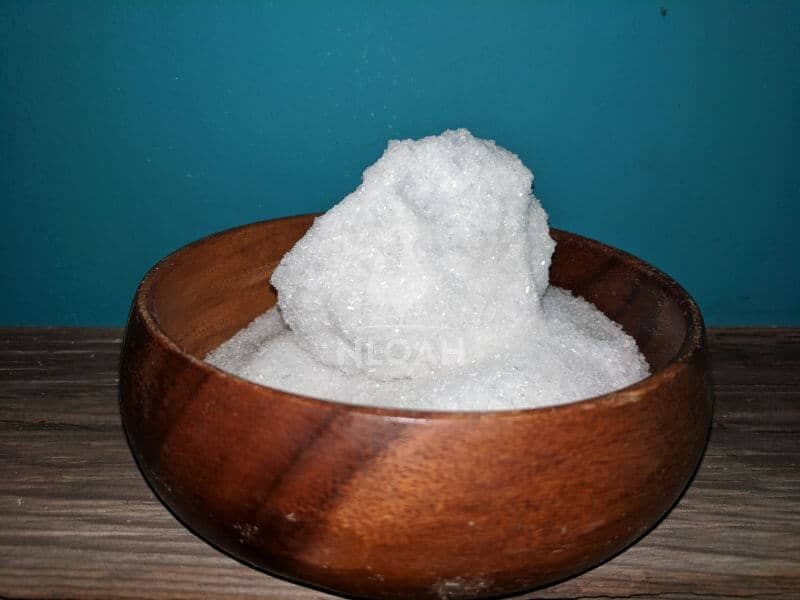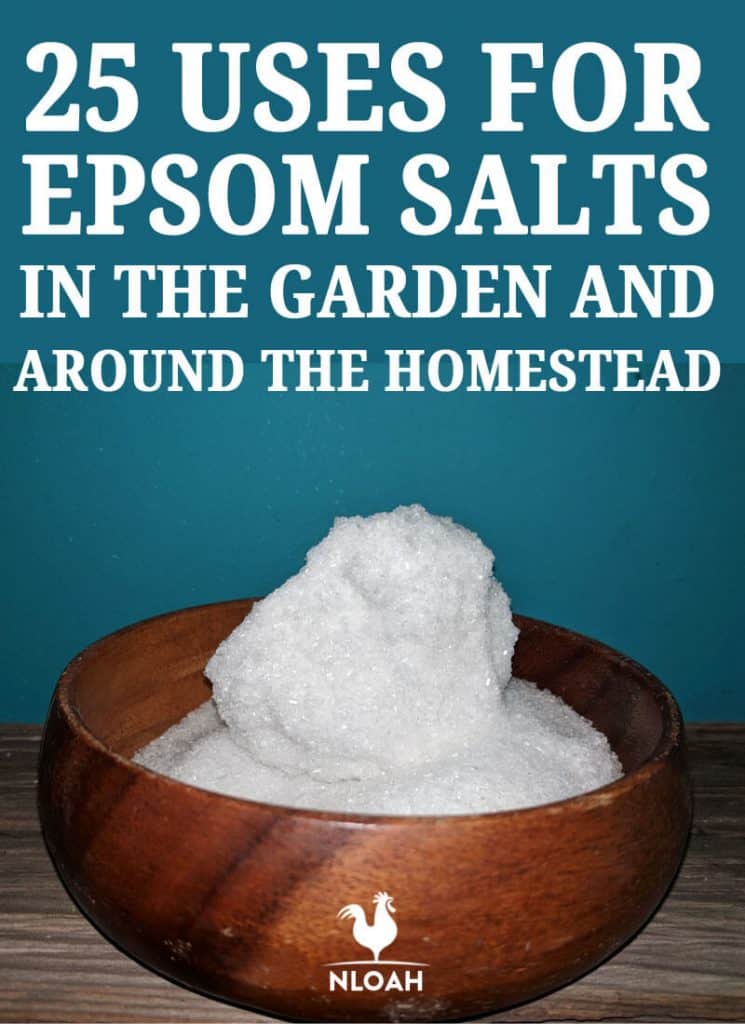Epsom salts are inexpensive, easy to find, and have copious amounts of uses in the garden, house, and around the homestead. The handy little carton or bag of magnesium sulfate should also be a part of any natural first aid kit.

Epsom salts are named for the English town in which they were discovered bubbling up from a spring. Sea salt also contains magnesium, but standard table salt does not – it is made from a sodium chloride mineral compound.
We do not use any chemical is our homestead growing plots or apothecary patch. Epsom salts have become one of our natural go-to grocery and medicine growing aids.
Those tiny little white particles help prevent destructive pests, heal wounds, soothe swelling, and do a bang up job of cleaning a plethora of common household items.
What Is Epsom Salt?
Epsom salt is comprised of both magnesium and sulfate. When the body lacks the proper amount of magnesium, in excess of 300 different enzymes can be distributed.
Some of the enzymes that rely on magnesium to function properly include those that contribute to controlling blood pressure, the cardiovascular system, and hyperactivity.
Sulfate is vital for the formation of protein in joints, flushing toxins from the body, maintaining mucin proteins, and maintaining healthy brain tissue, according to the Epsom Salt Council.
Top Epsom Salt Uses
1. To help trees better absorbs soil nutrients. Soak the root ball in a mixture of 1/1 cup of Epsom salts and 1 gallon of water and ½ cup of Epsom salts for approximately 60 minutes. The root balls need to air dry completely before being planted in the ground.
2. To help cultivate robust tomatoes and peppers by warding off a magnesium deficiency. Combine 2 tablespoons of Epsom salts and 1 gallon of water. Spray the entire plant once every two weeks.
3. To repair or prevent yellowing leaves on plants, pour 1 tablespoon of Epsom salts around the base of the plant once every 14 days. You could also mix the same amount of Epsom salt with 1 gallon of water, and spray the plants from the top down every two weeks.
4. Mix equal parts Epsom salts and coconut oil to create a makeshift soap.
5. Keep raccoons out of the garden and away from the eggs in your chicken coop by sprinkling Epsom salts around the area to be protected. The salts must be reapplied after a rain,but should otherwise remain potent for about seven days.
6. Use Epsom salts as a quality natural fertilizing agent. The magnesium in the salts will help plants better absorb sulfur, phosphorous, and nitrogen in the soil.
Simply sprinkle the salts around the base of the plant on a weekly basis. Use sparingly and apply in the early morning or late afternoon hours. 1 cup of Epsom salts for every 100 feet of growing area treated is the general rule of thumb.
7. Remove excess oil from your hair by mixing up to 9 tablespoons of Epsom salt to your shampoo. Rinsing the hair with warm beer, lemon juice, or apple cider vinegar will also help eliminate excess oil.
8. To clean surfaces that can withstand a mild abrasive agent, combine ½ of a cup of Epsom salts with 3 cups of warm soapy water.
9. Avoid transplant shock from young plants or seedlings by sprinkling 1 tablespoon of the salts into the lower section of the soil container several days before transplanting.
10. Slugs loathe Epsom salts because they scratch and irritate their flesh. Sprinkle the salts onto the sidewalk or in any area where slugs like to congregate.
11. Regenerate old batteries by combining ½ of a cup of distilled water and ½ of an ounce of Epsom salts. Soak the old batteries in the electrolyte solution to help improve conductivity.
12. Rid your homestead of weeds naturally without the use of caustic chemical by making an Epsom salt based spray. Combine 1 liter of distilled white vinegar, 2 tablespoons of Blue Dawn dish soap, and 4 tablespoons of the salts in a spray bottle. Shake vigorously to mix and then spray as needed – aim well, you do not want the vinegar getting on your plants or crops.
13. Improve the quality and green shade of your grass by infusing more magnesium into the soil. Combine 1 gallon of water and 2 tablespoons of Epsom salts to an agriculture sprayer, and treat your lackluster lawn by spraying liberally as needed – once a week should suffice.
14. Mix equal parts of the salts with water to make a natural homemade teeth whitener that might help combat periodontal disease.
15. Enhance the growth and production of fruit trees and berry bushes by infusing them with Epsom salts. Broadcast 1 tablespoon of the salts per every square foot of edible trees and bushes being treated. Epsom salts seems to work particularly well on plum, citrus, apple, and peach trees.
16. To remove unwanted tree stumps, drill multiple holes into the top using about a 1 inch bit. Fill the void halfway up with Epsom salts, and the rest of the way with water. Within about 7 to 14 days the tree stump should begin to decompose.
17. Exfoliate the skin by rubbing about one handful of Epsom salts onto a dampened area.
18. Mix your favorite deep hair conditioner with equal parts Epsom salts to use as a natural volumizer. Work the mixture, which should feel slightly warm, through the hair and allow it to sit for about 20 minutes before rinsing.
19. If you suffer a splinter, soak the injured body part in a mixture of Epsom salt and only enough water to form a thick paste texture to help pull out the splinter.
The salts are extremely shelf stable. When stored in a sealed container in a cool dry place, a container should last for at least five years – but quite possibly up to 10 years.


Tara lives on a 56 acres farm in the Appalachian Mountains, where she faces homesteading and farming challenges every single day, raising chickens, goats, horses, and tons of vegetables. She’s an expert in all sorts of homesteading skills such as hide tanning, doll making, tree tapping, and many more.
